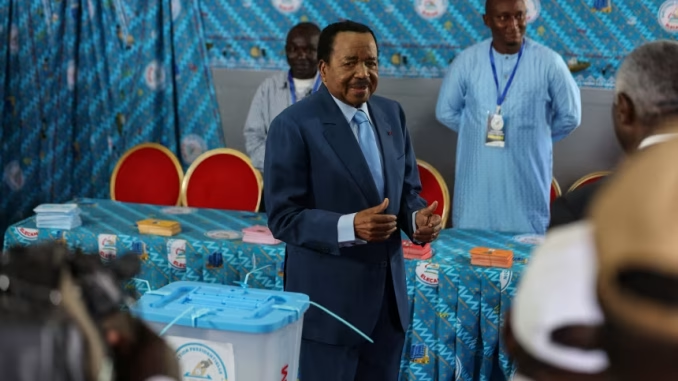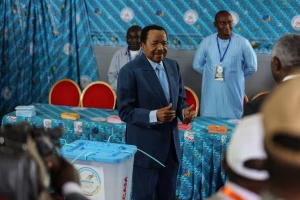
Cameroon went to the polls on Sunday in a highly anticipated election that could see Africa’s oldest leader and the world’s longest-serving president, Paul Biya, extend his 43-year rule by another seven years. At 92 years old, Biya’s bid has sparked national and international debate over leadership, transition, and the future of the Central African nation.
With results expected no later than October 26, the country now watches closely as ballots are counted.
A Nation at a Crossroads

Paul Biya, who first assumed power in 1982 following the resignation of Ahmadou Ahidjo, has governed Cameroon through seven consecutive electoral victories. If re-elected, he would remain in office until the age of 99. Cameroon, which gained independence in 1960, has known only two presidents in its history.
Despite his long tenure, Biya’s health and lengthy stays in Europe have raised questions about governance and succession. Everyday leadership duties are believed to be handled by close allies and family members, fueling public frustration.
Opposition Challenges and Rising Discontent
This election features nine opposition candidates, including former ministers and political insiders such as:
-
Issa Tchiroma Bakary – Former Minister of Employment
-
Bello Bouba Maigari – Former Minister of Tourism
-
Joshua Osih – Social Democratic Front (SDF), Member of Parliament
Biya’s Message: A Call to Continue
While launching his campaign, Biya appealed for stability and continuity, stating:
“In such a situation, I cannot shirk my mission.”
He cast his vote in Yaoundé, avoiding comments on his future until official results are released.
At polling stations across the country, reactions were mixed.
Despite generally peaceful voting, some stations reported tensions and accusations of irregularities. Low turnout was recorded in certain regions, especially areas affected by separatist conflict.
Security and Crisis Shadows the Vote
Cameroon faces multiple crises:
-
Anglophone Conflict in the west, where separatists challenge the Francophone-led government
-
Boko Haram Insurgency in the north causing widespread insecurity
-
Poverty and Economic Hardship, with 43% of citizens living below core poverty standards, according to the UN
Over 8 million registered voters, including more than 34,000 overseas voters, cast ballots at 31,000 polling stations.
Opposition Warns Against Fraud
Joshua Osih of the SDF expressed concern over transparency:
“The system makes it such that elections cannot be free and fair. The counting process will be long.”
Interior Minister Paul Atanga Nji warned candidates not to self-declare victory, insisting only the Constitutional Council has the authority to announce results. He also threatened legal action against private vote tally efforts.
What Comes Next?
With a single-round system, whichever candidate receives the most votes wins outright. Observers believe Biya’s ruling CPDM retains significant influence, but this election may signal growing demand for change among Cameroon’s overwhelmingly young population.
As vote counting continues, Cameroon, and the world, wait to see if the Biya era will continue or if a new chapter will finally begin.
Leave a Reply